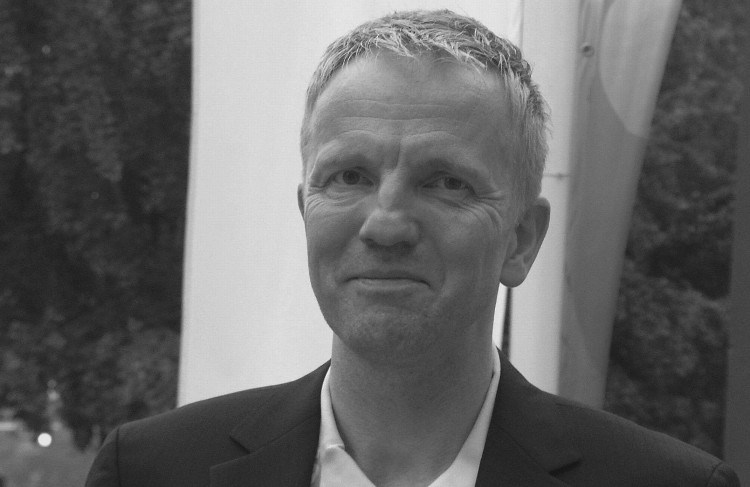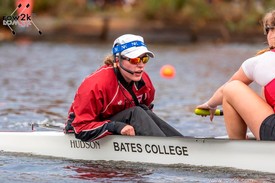Roland Baar: Old School

In many ways, Dr. Roland Baar, the legendary stroke of the German Men's Eight who died in an automobile accident this past weekend at 53, represents the oldest of the old school in rowing; he rowed in the same seat for almost his entire competitive career.
During his 11-year national team career for Germany, Baar stroked the German Men's Eight for eight years, or two full Olympic cycles, winning worlds five times ('89-91, '93, '95) and winning Olympic Silver (Atlanta '96) and Bronze (Barcelona '92). When Baar retired after the '96 Olympics, rowing had accelerated its development internationally away from roles such as his, the oarsman who perennially sat in the same seat of the same crew, for the better part of a decade.
Not that you would hear this from Baar himself; he was a man personally of few words, though his presence in a boat or at a regatta was unmistakable; tall (but never the tallest), skinny, with a shock of blond hair and a wan smile that, once on the starting line, was replaced by a characteristic German grimace as he seemingly willed whichever lineup he happened to be stroking that year or at that regatta to victory.
"We are all totally shocked and deeply saddened by Roland's tragic death," said his former teammate Frank Richter, who rowed as Baar's pair partner for 10 years, and raced with him in seven World Championships and two Olympics. "He was an exceptional personality, to whom many looked up. At the same time, he was incredibly humble and a good friend and teammate to many."
Baar lived for the eight, and he lived for his crews; towards the end of his career, at the '95 World Championships, when the German men's eight rebounded from a tough World Cup season to score another world title on the swampy waters of Tampere, Finland, the German Empacher had barely crossed the finish line of the final before Baar was up out of his footstretchers, up in the boat, and walking the gunwales all the way down to bow seat, enthusing with each of his teammates before launching himself around the neck of his long-time pair partner Richter in the bow seat. A stroke who always knew that his team had his back.

In 1996, during the lead up to the Atlanta Olympics, his crew suffered a string of significant losses to the Dutch Men's Eight, and for a long time it looked unlikely that his crew would even have a shot at a medal at the Olympics. Baar, who had announced before the Olympics that he was retiring from rowing, publicly hoped for "one more good race," then, as the Olympic regatta unfolded and his crew seemingly started to find their pace, he told the German press that "if we can find a good first part of the piece in the final, then we will be a factor." Led by Baar, the crew charged out of the gates and led the favored Dutch for almost 1100 meters before settling for a well-deserved Silver, another medal that Baar celebrated by celebrating the men behind him.
Even when he was competing at the top level internationally, Baar was never above enjoying the thrills of rowing at "street level" either; Baar was at home crashing on a couch in Somerville, MA during his two trips to the Head of the Charles in 1995 and 1996, often borrowing a fellow rower's bicycle to explore Cambridge, and in one instance, breaking a seat tube through sheer force from pedaling too hard up Massachusetts Avenue while racing cars out of Harvard Square.
At the Charles, Baar raced an All-star lineup in the champ eight with a few German M8+ teammates and a few of his competitive rivals from the 1992 Canadian Men's Eight. Ever a competitor, he delighted in the reaction of the US Men's team upon them seeing him row by on the Charles, and the prospect of having to race against a Roland Baar-stroked eight on their own turf.
Former competitors and rivals in the US, Olympians Jeff Klepacki and Sean Hall, who both competed against Baar as members of the USA M8+ between 1989 and 1996, remembered racing against Baar's crews.
"When I was in the stroke seat [of the US Men's Eight in 1994, eds], lining up against him you would look across and get a little smirk at the starting line and you just knew you were getting your best from this guy," said three-time US Olympian Jeff Klepacki. "We got the best of them that year, won the gold and set the record, but he came up to me and congratulated me as I did him. Looking across at the guy, stroke seat to stroke seat, you saw the competitiveness in his eyes and you knew you had to be prepared and ready. He was a great contributor to the sport. It's really sad what happened. Fifty-three is just too young."
"Rowing has lost a legend," added Hall. "I feel like I had a personal connection to him as our races in 1994-95 were so hotly contested. He certainly set the standard for us as a crew to aspire to, and was in fact incorporated both into our daily training - as a focus of discourse - and in our racing, as a target."
After the conclusion of his rowing career, FISA honored Baar with the 1998 Thomas Keller medal. Marty Cross, a former GB rowing star and an international legend in his own right, summed up Baar's competitive impact succinctly for the Keller medal presentation. "More striking [than his victories] was the way in which this was achieved: with aggressive, high-rating, front-loaded racing, the hallmark of which was a distinctive technical precision which became the envy of other crews."
As news of his death spread throughout the rowing world, friends and former competitors paid tribute to an athlete who had impacted both his crew and his sport in a fundamental way. ""All at FISA are greatly saddened at this tragic loss of a huge man, an amazing rower and great contributor to the Olympic movement and the sport of rowing," said FISA's Matt Smith in a statement.

"Roland Baar was relentless but always fair in his drive to succeed which came through as well in his professional life. Everyone knew that, with Roland in the stroke seat, you had someone who would give 200% right up to the finish line, and never doubt it."
After his competitive career, Baar continued to contribute to the Olympic movement of rowing, first as an athlete representative at the International Olympic Committee, where he championed athlete's issues, then from 1999 to 2004 as an IOC Member. Baar also served on the National Olympic Committee of Germany as well as the ombudsman for the German National Anti-Doping Agency (NADA).
The stability of having "one job" in the German eight played out privately for Baar as well. Married early in his rowing career to his wife Kathrin, and proud dad to two kids, Baar balanced rowing, his Ph.D. studies, his ensuing professional career with Volkswagen as an engineer, and finally, an academic career at the Technical University of Berlin bearing probably the most apt title for a former eight-oared strokeman as a "Professor for Internal Combustion Studies."
"Dr. Baar's professional career still serves as a lodestar for the development of new world-class athletes in German rowing," said former GER M8+ coxswain Martin Sauer in a press release from the Dortmund training center, the longtime home of the German Eight. "Baar always emphasized the importance of his academic career and his professional path as invaluable for his successes during and after his rowing career. His career path shows how those habits he acquired during his years as a high-performance rower are valuable to life outside of rowing, and this principle informs the core of our development of all athletes in the German Men's Eight to this day."
Though Baar was reserved in person, many of his thoughts on rowing found their way into wider circulation through his guest columns for the German rowing magazine "Rudern." In contrast to the cliché of the tightlipped engineer, Baar seemed to find exactly the right words to convey the power of rowing in everyday life. "Spring is the most expansive time of year," wrote Baar in early 1999, waxing poetic. "Cold, gray winter is gone, replaced by color and light. Your boat is turbocharged. When you roar across the water, then you are truly able to feel everything more deeply. On days like this, I realize more fully that our sport is special."
In another column Baar attempted to explain the concept of 'athletic rhythm' thusly: "Life is without a doubt rhythm! But rowing is of course also rhythm. Everything we do seems to occur on the basis of rhythm. A lot becomes easier when you can depend on certain structures because they always repeat. After these few examples, we arrive at the simple thesis that we know we are alive when we row."
Well said, Dr. Baar.
If you enjoy and rely on row2k, we need your help to be able to keep doing all this. Though row2k sometimes looks like a big, outside-funded operation, it mainly runs on enthusiasm and grit. Help us keep it coming, thank you! Learn more.
Comments | Log in to comment |
There are no Comments yet
| |
- Bont Rowing
- Calm Waters Rowing
- Concept 2
- Craftsbury Sculling
- The Crew Classic
- CrewLAB
- Croker
- Dad Vail Regatta
- Durham Boat Co.
- Empacher
- Faster Masters
- Filippi
- Fluidesign
- h2row.net
- HUDSON
- Live2Row Studios
- Nielsen-Kellerman
- Oak Ridge RA
- Peinert Boat Works
- Pocock Racing Shells
- Race1 USA
- RowKraft
- Rubini Jewelers
- Vespoli USA
- WinTech Racing
- Bont Rowing
- Calm Waters Rowing
- Concept 2
- Craftsbury Sculling
- The Crew Classic
- CrewLAB
- Croker
- Dad Vail Regatta
- Durham Boat Co.
- Empacher
- Faster Masters
- Filippi
- Fluidesign
- h2row.net
- HUDSON
- Live2Row Studios
- Nielsen-Kellerman
- Oak Ridge RA
- Peinert Boat Works
- Pocock Racing Shells
- Race1 USA
- RowKraft
- Rubini Jewelers
- Vespoli USA
- WinTech Racing

















